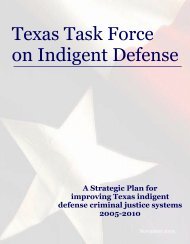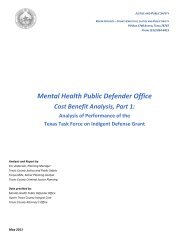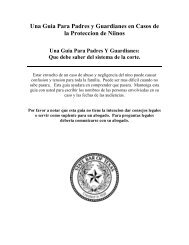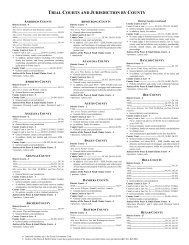1 Texas Judicial Council Juvenile Justice Committee - Texas Courts ...
1 Texas Judicial Council Juvenile Justice Committee - Texas Courts ...
1 Texas Judicial Council Juvenile Justice Committee - Texas Courts ...
You also want an ePaper? Increase the reach of your titles
YUMPU automatically turns print PDFs into web optimized ePapers that Google loves.
There is precedent for limiting the use of citations. <strong>Texas</strong> law does not allow citations to be issued to<br />
corporations, associations, or people who are publicly intoxicated. Because public schools are<br />
authorized and expected by the public to handle misbehavior without immediately resorting to the<br />
criminal justice system, special rules governing the use of citations for fine-only offenses on school<br />
property are warranted.<br />
The proposed Subchapter E-1 would prohibit the issuance of citations at public schools for non-traffic<br />
offenses. It would not preclude law enforcement from issuing a citation to a student who is not a child<br />
(i.e., a person legally an adult, 17 years of age or older).The proposal would neither affect a peace<br />
officer’s authority to arrest a child nor preclude school officials or employees from filing charges in<br />
court.<br />
In lieu of using citations, a system of enhanced complaints would be utilized. Under current law, some<br />
school-based offenses are already instigated by complaint (e.g. Failure to Attend School). However,<br />
the information in the complaint rarely provides ample information to assess the merit of the<br />
allegation. Enhanced complaints provide greater information to prosecutors, defense lawyers, and<br />
judges. As proposed, the complaint for all non-traffic, school based offenses would be accompanied by<br />
additional information that prosecutors and judges need to know in order to ensure fair and proper<br />
administration of justice for children.<br />
Akin to provisions governing prosecutions in juvenile court, the proposed Subchapter E-1 would also<br />
give local prosecutors the discretion to implement filing guidelines and obtain information from<br />
schools. Some prosecutors have experienced opposition from schools when attempting to procure<br />
additional information before allowing a school-initiated complaint against a child to proceed.<br />
Expressly authorizing such guidelines and allowing prosecutors to obtain such information is necessary<br />
to ensure that only morally blameworthy children are required to appear in court and enter a plea to<br />
criminal charges. Federal law precludes punishing special education students when the student’s<br />
misbehavior is a manifestation of a disability. Prosecutors should be able to ascertain if a child is<br />
eligible for or is receiving special education services, has a behavioral intervention plan (BIP), or has a<br />
disorder or disability relating to culpability prior to the filing of charges. Prosecutors should also be<br />
able to easily ascertain from schools what disciplinary measures, if any, have already been taken<br />
against a child to ensure proportional and fair punishment.<br />
The greatest consumption of limited local judicial resources occurs in school districts where issuance<br />
of citations is common practice for the resolution of school discipline issues. Under this proposal,<br />
rather than immediately referring children to court, school districts who accuse a child of disrupting<br />
class, disrupting transportation, or engaging in disorderly conduct, would first attempt to address such<br />
misconduct attempt through progressive sanctions administered by the school.<br />
FAMILY CODE<br />
TITLE 3. JUVENILE JUSTICE CODE<br />
CHAPTER 52. PROCEEDINGS BEFORE AND INCLUDING REFERRAL TO JUVENILE COURT<br />
Sec. 52.03. DISPOSITION WITHOUT REFERRAL TO COURT.<br />
(a) A law-enforcement officer authorized by this title to take a child into custody may dispose<br />
of the case of a child taken into custody or accused of a Class C misdemeanor, other than a traffic<br />
8


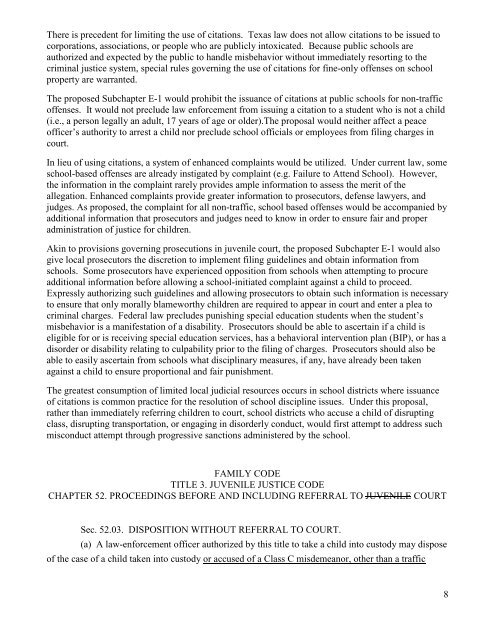
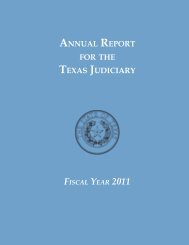
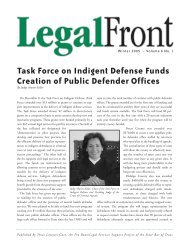
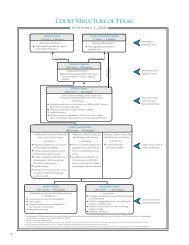
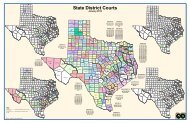
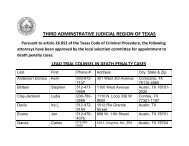
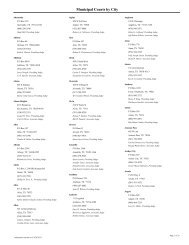
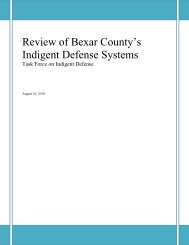
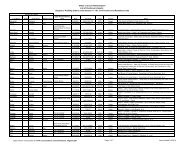
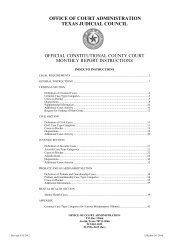

![Summary Report [pdf] - Texas Courts Online](https://img.yumpu.com/27405334/1/190x245/summary-report-pdf-texas-courts-online.jpg?quality=85)
